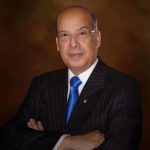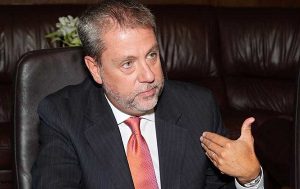
Dr. Sir Ronald Sanders former Caribbean diplomat
The Organisation of American States (OAS), already a broken institution, was shattered even more on April 9 at a meeting of its Permanent Council. It is now an organisation whose membership is deeply divided and amongst whom mistrust, and bitterness now predominates.
How this huge problem will be fixed – if it can be fixed at all – is the paramount challenge that now confronts its 33 and a half members. I will return to the half-member later in this commentary.
Nothing that I say in this commentary is a secret. The Permanent Council meeting of April 9 was played out in a live webcast on the OAS’ website.
The meeting was held, after weeks of efforts by the United States and most of the members of the so-called Lima Group, to secure the adoption of a resolution that would unseat the representative of the Nicolas Maduro government and replace him with the nominee of Juan Guaido. Guaido is the self-proclaimed “Interim President” of Venezuela, so recognised by roughly 50 of the more than 200 governments in the world.
The manoeuvrings behind the scenes had a single purpose and that was to procure 18 votes, constituting a simple majority of the 34 member-states, to impose Guaido’s nominee as Venezuela’s representative.
It took some time for the core 14 countries to woo the support of 4 others, not least because the manner of pushing the resolution through the Permanent Council defied international law and the Charter and rules of the OAS. Governments had to dig deep to balance disregard for the integrity of the OAS as an institution and a desire to help those countries that were determined to seat Guaido’s representative.
The meeting was summoned for high noon on April 9 and all delegations were cautioned to be on time for a prompt start. As it turned out delegates were forced to wait until after 1pm to start the meeting because, at the last minute, Jamaica – one of the faithful 18 – insisted on new language, causing commotion among the group and threatening to derail its entire effort.
Even when the resolution was presented to the Permanent Council Meeting and was being debated, it was unclear what text was being considered. What was before the meeting was the original text, omitting the Jamaica language. A request from me, as the representative of Antigua and Barbuda, for clarification, resulted in a break in the meeting’s proceedings to produce the final text of the resolution. Its main purpose remained to accept the appointment of “the National Assembly’s designated Permanent Representative”.
There was much solemn and serious debate about the entire proceedings, but in the end, 18 countries, using their razor-thin majority, forced the vote through.
Some self-interested governments have characterised the April 9 meeting as a clash of support for or against the contending forces in Venezuela. Sections of the media have followed that line.
But, far from being about Maduro/Guaido and Venezuela, the meeting was about selling or saving the soul of the OAS; it was about disregarding international norms and ignoring the institutional framework of the Organisation for the short-term political purposes of a few; and it was about arguing for the retention of the OAS’ integrity.
At the end of the vote, passed by a simple majority, the Ambassador of Mexico, Jorge Lomónaco Tonda, summed-up the meeting well. He said: “There were no winners or losers; only losers”. And, the biggest loser was the OAS itself.

Jorge Lomónaco Tonda,. Photo courtesy http://planoinformativo.com
Nowhere in the Charter of the OAS, or in its rules, does the Permanent Council have the authority to decide on the recognition of a government. Further, as was stated repeatedly at the meeting, the recognition of a government is the sovereign right of states and cannot be determined or imposed by a multilateral organisation. At the very least, the matter, given its high political importance, should have been considered by a special session of the general assembly, the highest organ of the OAS.
What the hasty, ill-considered process succeeded in doing is damaging the OAS as an institution, tainting its structure and governance, harming relations between its member sates and rendering it unfit for anything but achieving the purposes of a wilful majority of 18 countries.
The vote on recognition of the National Assembly’s representative was really about the de-recognition of the Maduro government’s representative. While that may have been achieved within the OAS, it has changed nothing in the international community. Countries that recognise Maduro or Guaido as President of Venezuela continue to do so.
Nothing has changed in Venezuela either. This vote has achieved no new negotiations and no solution to the humanitarian situation. If anything, it has served only to harden the opposing sides in the political conflict, closing the door to solutions.
To return now to the 33 and a half members of the OAS. The national assembly’s representative may be seated in front of the Venezuelan flag, but he cannot speak for the government that is in charge of Venezuela. A vital test of recognition of a government, in international law and practice, is whether it exercises effective control of the affairs of the country. The National Assembly does not have effective control of Venezuela, and its representative cannot speak, in the OAS, for the de facto government.
There is a further question regarding the authenticity of the representative’s credentials which appear to have been overlooked, deliberately or otherwise by the OAS Secretariat.
The National Assembly nominated a “Special” representative to the OAS, but there is no such category of representation. Further, as pointed out in the meeting by the Ambassador of Guyana, Riyad Insanally, the letter to the Secretary-General from Mr. Guaido, signed as “Interim President of Venezuela”, designating the “Permanent” representative, was dated January 22, 2019. But his proclamation as “Interim President” took place on January 23, 2019. In other circumstances, these discrepancies would not have been accepted.
The OAS is now in many ways a sadly compromised organisation. The fight on April 9, 2019 to sell or save its soul defines it now and can limit its effectiveness in the future.
Why should we care? Because it is the only hemispheric organisation in which all countries (except Cuba) sit, and which had the mandate and the opportunity to keep the region peaceful and to pursue cooperation that could make a difference to the lives of all its people. All that is now corrupted.
(The writer is Ambassador of Antigua and Barbuda to the United States and the Organisation of American States. He is also a Senior Fellow at the Institute of Commonwealth Studies at the University of London and at Massey College in the University of Toronto. The views expressed are entirely his own)
Responses and previous commentaries: www.sirronaldsanders.com


